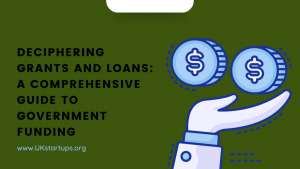Small Business Startup Costs: How much will it cost?
Thinking about starting a small business in the UK? Starting a small business is exciting: you have a chance to showcase all of your talents and put forth your experiences in order to create a business of your own that you can believe in. But the process isn’t simple. Starting a small business requires time, dedication and, yes, money! So, what are the small business startup costs?
Small Business Startup Costs: How much will it cost?
As a new small business idea comes to mind, typically you will want to start by writing a business plan. The finances may be hard to figure out so early on but if you start with the business plan you will begin to realize the small business startup costs that you have to make and you will have a better understanding of how much it will all cost.
If you are well organised and thorough, you can plan out your business, your financials and keep your small business startup costs low and budget on track.
While small business startup costs can vary from location to location and industry to industry, there are certain costs associated with starting a business that will always remain consistent. Be sure to read on to understand the costs of starting up and how to ensure you have the funding you need.
Start your business – but start it small
Every single person coming up with a small business idea at one point has had money on their mind as they come up with every possibility of how this business will make them rich and successful.
It’s great to have high expectations for your company. This is how you should think about your endeavour.
However, the same train of thought can lead you down the wrong path and pretty much force you to invest too much far too quickly (especially concerning if you are borrowing funds to start up).
In the very early stages of starting a small business in the UK, your small business startup costs should be well organised and pretty much pre-planned with very little room for unexpected purchases and expenditures (however, always have backup funds set aside for the unexpected).
Take a second right now and try the Small Business Startup Assessment Tool, and see what stage you’re in, what you still need to succeed and how much funding you may be eligible for from government sources.
When speaking to many business owners that we manage here through UKStartups.org, some of the best feedback we receive from those who have succeeded with their startups is to go into business expecting to fail (at least in terms of spending). It’s simple really, if you are not assuming growth and success you won’t spend frivolously. Success will come naturally if you are careful.
With any small business starting up where the initial funding amount of capital to start with is a concern, you can always start small, in an inexpensive way to test out the clientbase, your products/services and to get a feel for it. If the test you perform seems to be somewhat successful, then go from there and start planning your business further and allocate additional funding.
How much a small business startup costs depends on you and how much you are willing to spend.
Business owners across the UK have been known to spend millions on their startups and fail – while some have spent under £1,000 and have succeeded. Ultimately, how much you spend on your startup depends on you and your needs.
Estimating your small business startup costs
As mentioned earlier, the costs a small business startup has to cover vary from location to location (London may be more expensive to open a business than East Yorkshire), your industry plays a big role on startup costs (if you need to have a machine for your business versus having an online eCommerce store that drop-ships products), and of course various other factors such as availability of funds, time to dedicate to the business, employee needs and more.
The basic costs that a small business must cover initially when starting up can consist of the following:
- Tools and equipment needed
- Business registration and licence fees
- Office space
- Inventory
- Marketing
- Website
- Internet and phone bill (other utilities)
- Payroll
- Insurance
- Travel
- Shipping costs
- VAT
While certain business types can start up with relatively low small business startup costs of under £1,000, an average small business owner in the UK spends about £4,000 to £8,000 to start their small business.
One of the main reasons many small business owners fail early on is because they run out of funds. While writing a business plan and forecasting your small business startup costs can help, it doesn’t always end up 100% accurate, especially as a new business not knowing the figures perfectly. It is said to ensure you have 3 months of backup funds available shall you decide to go into business – or at least have it prepared in terms of where to source the funds shall you need it.
Different types of small business startup costs
Not all small business startup costs are the same.
In any given business, there are always one time costs, ongoing costs, essential costs, optional costs, fixed costs and variable costs.
So what are the differences?
It is very important as a small business startup to know how much it costs to start the business and understand the different types of small business startup costs.
One-time startup business costs are those costs that will most likely be relevant only in the early on startup process such as the expenses for registering the business or purchasing equipment. This means that the costs for that timeframe will obviously be higher but will dip the following month as it was a “one-time cost”.
Ongoing costs are exactly what it says they are. These are costs that are reoccurring. These types of expenses are predictable and they don’t often fluctuate. Some ongoing costs can include payroll expenses or utilities.
Essential startup costs are costs associated with starting a business and costs that are absolutely necessary for the business to sustain and grow. For example, for an online eCommerce store, an essential cost would be website development or marketing.
Optional business costs are those costs that you’d like to have but are not 100% necessary yet. Think about a painting company that wants to get the new Mercedes van for their business but not just yet because their current van is still pretty good – that is an optional cost. Also known as a “would be nice cost” as it would be nice to have that.
Fixed costs are often costs such as rent, which are consistent month-to-month.
Variable costs are costs associated with your business that change depending on the situation. For example as a retail store, your inventory would be a variable cost. A cost that changes because you don’t know how much you will sell each month.
Projecting your cash flow
When starting a small business, the most difficult thing early on is your business plan and projecting your cash flow in order to determine how much your business will make and how much your small business startup and ongoing costs will be.
While there are tools such as the Business Plan Builder which automatically project your cash flow you may want to have our experts review your startup projections as well.
Projecting your cash flow isn’t very easy but as a startup business owner, a business plan is vital. So be sure to enter your expected sales revenues (hopefully you’ve done some research on this and know how much to expect your business to make). It doesn’t have to be 100% accurate, but an approximate estimate. From that, it is recommended to deduct all of your expenses (think marketing, utilities, bills, loans, payment, payroll…everything) and use that to figure out your cash flow and projections moving forward.
Money to cover your small business startup costs
After you’ve had a chance to complete your business plan, to figure out how much money you need to start your small business, you’ve done your financial projections, the next step is figuring out the money.
Where will the money come from?
Do you have the funds in pocket? Credit card? Line of credit? Consider borrowing from private investors or perhaps try government funding?
Remember how you obtain funds to cover your small business startup costs will affect the future of your small business so it is important to be smart about it.
As mentioned, personal savings, loans from family and friends, bank and government loans, and grants are just a few potential funding sources. Many companies use a combination of sources in the early stages to start up.
To get help from government funding agencies and receive a government grant, a government loan or startup funding from the UK government consider using our Funding Calculator Tool to see how much you may be eligible for and if it’s obtainable for your specific business and industry.
SEARCHES RELATED TO BUSINESS PLAN FOR STARTUPS
business plan for startups
business startup costs
small business startup cost





